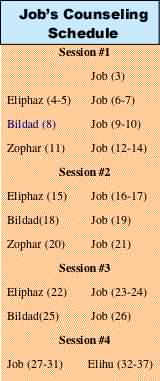Search for the Right Perspectives
Book of Job 3 - 37 – The Bible Teaching Commentary
FACING THE TESTS OF LIFE |
| 1. Thoughts on Life's Goals (1:1-5) |
| 2. Endurance for Serious Troubles (1:6-2:13) |
| 3. Search for Right Perspectives (3-37) |
| 4. Time before a Holy God (38-42:9) |
| 5. Satisfaction with Life's Reward (42:10-17) |
The Purpose of Job
Hebrew poetry uses its special literary design to add emphasis and beauty to the passage. The Book of Job is no exception. With five sections, this third section is positioned smack in the middle. More than just its placement, however, is its length. There is no contest to which section of Job is the largest. It is this third section. The size itself points the important place it has in comprehending Job's message. Unfortunately for most readers they have discovered this section. They would love to read more about the beginning of Job and find out more of his life. No one has a problem reading about the severe testings that Job faced. The coverage was good but very limited. Nor do people mind reading more of his encounter with God or how he regained his position with life. Job isn't written to satisfy people's curiosity. Creating a wide audience with major interest stories is not its purpose. There is a purpose of the Book of Job that overshadows the testings and sufferings of life. This middle section with all of its grand emphasis points us to this chief purpose of Job.
 We are not saying that the things we learn from Job's testings are not significant, but simply they are not the major purpose of the book. We need to think why 34 out of 42 chapters[1] are focused on dialogue between some well known community leaders. This is a huge hunk of the Book of Job (81%) which many readers would rather jump over. They don’t mind reading a few chapters, but the words, the people, the accusations and replies seem to get rather repetitious. They are right! But why? Is it merely to cause us to be cautious when we counsel others? This certainly is one application, but 34 chapters are not needed to emphasize it! There is a greater purpose. Let me share with you what this overarching purpose is.
We are not saying that the things we learn from Job's testings are not significant, but simply they are not the major purpose of the book. We need to think why 34 out of 42 chapters[1] are focused on dialogue between some well known community leaders. This is a huge hunk of the Book of Job (81%) which many readers would rather jump over. They don’t mind reading a few chapters, but the words, the people, the accusations and replies seem to get rather repetitious. They are right! But why? Is it merely to cause us to be cautious when we counsel others? This certainly is one application, but 34 chapters are not needed to emphasize it! There is a greater purpose. Let me share with you what this overarching purpose is.
The chief purpose of Job is to clarify how God sometimes allows the righteous to suffer. In other words, the questions are not about the wicked who suffer but the righteous ones. We can understand why the wicked need to suffer. They need to be judged. They cause others harm. Job’s counselors rightly understood this. The wicked will be judged. But they also rightly understood that the righteous will be rewarded. But what they couldn’t see is that sometimes the righteous will suffer. They simply concluded that the righteous would always be blessed and never suffer wrong. Sometimes I hear Christians going through very rough times wondering whether the blessings promised to the faithful and obedient will ever come about. Of course it is true, but the statement is loaded with mistaken notions. If one says yes, then people tend to draw the conclusion that the faithful will never suffer. If they don't suffer because of doing well, then it is because they suffer because they are doing wrong. The wrong in their minds had to be there. Job's counselors made this wrong conclusion. They just assumed Job was wicked but that his wicked acts were hidden from sight. Notice the following excerpt from one of Job's so-called counselors. This round has already become much more volatile and openly accusatory.
The wicked man writhes in pain all his days, And numbered are the years stored up for the ruthless. Sounds of terror are in his ears, While at peace the destroyer comes upon him. He does not believe that he will return from darkness, and he is destined for the sword. He wanders about for food, saying, ‘Where is it?’ He knows that a day of darkness is at hand. Distress and anguish terrify him, They overpower him like a king ready for the attack, because he has stretched out his hand against God, and conducts himself arrogantly against the Almighty. (Job 15:20-25)
As long as the counselor's own life is going smoothly, they can easily speak in this vein. In the above passage Eliphaz infers Job is a wicked man (15:21). Job is the one that is suffering. The reason is simple. "He has stretched out his and against God, and conducts himself arrogantly against the Almighty" (15:25). Job is not being blessed because he has done some wicked thing against God.
This concept is expanded in an article on Job 8. In the first volley of arguments Job's accusers are still polite. It helps us more clearly see their assumptions and not get distracted by the 'noise' of their later statements. Their main assumption is that suffering is always due to God's justice against the ungodly. To them there are no exceptions. The truth is, however, that God does make exceptions–at least temporarily. Sometimes the righteous do suffer. But in the end, they will be greatly rewarded. We need the whole picture of life in the setting of eternity to see all of this worked out. The Book of Job of course gives us the 'whole story' of one person named Job.
The exceptions are not with God’s justice. God does judge evil and reward good. God still treats people appropriately. But in order to apprehend a greater goal, the righteous are allowed to suffer for a while. God does not have to explain His decisions for allowing the righteous to suffer. He graciously gives us a quick look at His divine operations so that we have absolutely no cause to 'blame' God for the evil that comes upon the righteous.
Job is shown to be a righteous man. God opens the curtains to help us understand the real facts in case we doubted Job’s character. God’s assessment helps a lot here! Most important for us to remember in our hearts and counseling is that God does sometimes allow the good and righteous ones to suffer. I believe the reason for this is that God was preparing His people for the work of the Messiah, Jesus Christ. (Click here to read more on this).
Job the righteous man suffered. Jesus Christ would one day suffer. But this does not mean Jesus Christ was sinful. Without this notion embedded in the Jewish mind, they would never be able to accept Christ’s work without condemning Christ Himself. With the revelation from this book, we have to recognize that some who suffer like Job can be very good people. Jesus the Messiah of course was righteous even though severely bruised and beaten. We learn it wasn’t for His own sin but for others that He suffered (see Isaiah 53).
Job & Counseling
 Although counseling is an often-used word today, we have learned little of the great mistakes that can be made during counseling sessions. Counselors are often wrong. When they are wrong, people are deeply hurt. Job evidently took some time to recover from his friends accusations (Recovery only came after Job forgave and prayed for his friends -Job 42:10).
Although counseling is an often-used word today, we have learned little of the great mistakes that can be made during counseling sessions. Counselors are often wrong. When they are wrong, people are deeply hurt. Job evidently took some time to recover from his friends accusations (Recovery only came after Job forgave and prayed for his friends -Job 42:10).
The scriptures repeatedly warn us about false teachers and bad shepherds, but we don't really believe it is a problem that affects us. Is it because we tend to think we are too clever to be doped by someone who has false teachings? Or do we believe counselors live above the problems of theology? After all, have they not earned advanced degrees? Both mindsets are common and devastating.
Everyone has a theology or a set of presuppositions about how God, man and the devil operate on this globe. Whenever someone has poor or inaccurate theology, he will certainly misdirect people away from truth and clarity. They will always suffer harm because of false counsel. This advice came to Job like a sword. On the hand he heard his friends saying he should repent when in fact he was trying to keep trusting God. The intended tension induced by the evil one was trying to cause Job to blame God.
People's concepts about God and His world greatly shape what they think or say to a fellow man about his personal problems. We personally need to be careful about what we say to another. The more smoothly things are going in life, the easier it is to condemn those who are having problems. The wealthy can easily blame the poor for their problems.
Sometimes what we think of as 'proper theology' does not insulate us from the problem seen in this section. It is easy to conclude that those with theological degrees have more accurate views. This is hardly true. In fact, if we learn anything from the Book of Job or the various trained religious leaders in Jesus’ time, experts are often seriously wrong.
Above all, we need to be biblical Christians. That is, we need to be a people who are shaped by God’s Word. Many of us read God’s Word but few are really sizably impacted by His voice.
Chapters 3 to 37 record for us four counseling sessions. Job faced four different times of confrontation by his friends. They were courteous enough to show polite respect the first week, but it is as if they were loading up on ammunition the whole time! More than likely they were. We all need to be cautious on what we counsel others.[2]
Summary: Suffering with a Purpose
Before closing, we ought to take a quick look at John 15:2. “Every branch in Me that does not bear fruit, He takes away; and every branch that bears fruit, He prunes it, that it may bear more fruit.” We quickly discover there are two kinds of branches: (1) those that do not bear fruit and (2) those that do. Each branch is treated in its own special way according to how it bore fruit.
The fruitless branch is lifted (more accurate than taken away) and propped up so that it can bear fruit. Down on the ground it gets muddy and diseased. Grape plants need the open movement of the air. More important to our discussion is the treatment of the branch that bears fruit. Job was a righteous man and had a good effect on those around him.
Because I delivered the poor who cried for help, And the orphan who had no helper. The blessing of the one ready to perish came upon me, And I made the widow’s heart sing for joy. I put on righteousness, and it clothed me; My justice was like a robe and a turban. I was eyes to the blind, And feet to the lame. I was a father to the needy, And I investigated the case which I did not know. And I broke the jaws of the wicked, And snatched the prey from his teeth. (Job 29:12-17).
This is the branch that abides in Christ. His fruit comes from His relationship with Christ. He is the righteous one. In total surprise to us, the Lord prunes the good branch. Pruning stands for harsh and drastic action that is taken toward the good branch that results in losing a portion of it. This speaks volumes about pain. Difficulties and suffering all in one go. The only solution is to patiently wait for that branch to grow again. Only then will one be able to see the good purpose of the one that pruned.
We again see that it is not unusual for the righteous to pass through difficult times. God’s purposes are always to bear more fruit, that is, to bring further blessing into their lives. God wants His people closer and closer to Him.
Job 3-37
Counseling Time for Job
Bible Study Questions
1. How did Job show his fear of God through these counseling situations?
2. Did Job sin?
3. How do we minister to those needing advice? How can we best learn from the mistakes of Job's friends?
4. How can we profit from those giving advice to us?
5. What can we do to protect ourselves from bad counselors?
6. What were the counselors' arguments? Were they wrong? If so, how?
7. What was Job's responses?
Life Applications
1. Have you been exposed to 'false teaching' or a counselor who did not give you a proper perspective of what God wanted done?
2. What did you do? Did you know at the time? How might it be different this time?
Overview of Articles on the Book of Job
Introduction to Job Overview of Job Purpose of JobJob 1:1-5 Job 1:6-2:13 Job 3-37 Job 8_Counseling Job 38-42:9 Job 42:10-17
Other articles on suffering:
Finding Peace in Tragic Times Explanation of Judgment Isaiah53 & Development of Character
BFF Homepage | Top | Back | Bible Articles | Next
Biblical Foundations for Freedom
Rev. Paul J. Bucknell
[1] Remember that the original chapter and verse markers were not in the original Book of Job. The five sections are easily marked off without those markers. In fact, we see that the chapter divisions cause confusion rather than clarity in the first and last sections by merging two sections together. Job 1:1-5 should be its own chapter.
[2] The problem gets quite complex because we need to encourage faith and confidence. One cannot be dubious about what the patient needs. And yet, where does that confidence really come from. Without that confidence, there is no healing. Our confidence in the end must be from our personal knowledge of God and His Word.
